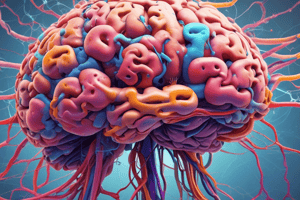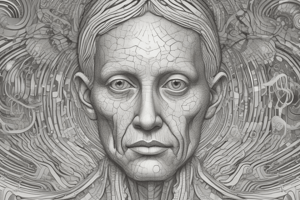Podcast
Questions and Answers
What type of neurons are primarily degenerated in Huntington's disease?
What type of neurons are primarily degenerated in Huntington's disease?
- Dopaminergic neurons
- GABAergic neurons (correct)
- Serotonergic neurons
- Cholinergic neurons
Which neurotransmitter is predominantly missing in individuals with jerky involuntary movements in Huntington's disease?
Which neurotransmitter is predominantly missing in individuals with jerky involuntary movements in Huntington's disease?
- Acetylcholine
- Serotonin
- GABA (correct)
- Dopamine
How many CAG repeats in DNA are characteristic of Huntington's disease?
How many CAG repeats in DNA are characteristic of Huntington's disease?
- More than 120 (correct)
- 10 to 35
- 35 to 120
- 2 to 10
If a person has 119 CAG repeats in their DNA, how many glutamines are likely present in the protein?
If a person has 119 CAG repeats in their DNA, how many glutamines are likely present in the protein?
Which statement accurately describes the inheritance pattern of Huntington's disease?
Which statement accurately describes the inheritance pattern of Huntington's disease?
What is the consequence of having 119 CAG repeats in DNA?
What is the consequence of having 119 CAG repeats in DNA?
Which of the following symptoms is NOT associated with Parkinson's Disease?
Which of the following symptoms is NOT associated with Parkinson's Disease?
Which person is most likely to develop Parkinson's Disease?
Which person is most likely to develop Parkinson's Disease?
What primarily contributes to the development of most cases of Parkinson's Disease?
What primarily contributes to the development of most cases of Parkinson's Disease?
Which area of the brain is primarily affected in Parkinson's Disease?
Which area of the brain is primarily affected in Parkinson's Disease?
Which brain condition primarily affects the initial brain areas involved in memory?
Which brain condition primarily affects the initial brain areas involved in memory?
Which cellular event is commonly observed in Alzheimer's disease?
Which cellular event is commonly observed in Alzheimer's disease?
What genetic mutation is primarily responsible for Huntington's disease?
What genetic mutation is primarily responsible for Huntington's disease?
What is a defining characteristic of Amyotropic lateral sclerosis (ALS)?
What is a defining characteristic of Amyotropic lateral sclerosis (ALS)?
Which condition's progression may lead to a minimally conscious state?
Which condition's progression may lead to a minimally conscious state?
What is neurodegeneration characterized by?
What is neurodegeneration characterized by?
Which disease is specifically characterized by amyloid beta plaques and tau tangles?
Which disease is specifically characterized by amyloid beta plaques and tau tangles?
In which area of the brain does Alzheimer’s Disease first affect structure and function?
In which area of the brain does Alzheimer’s Disease first affect structure and function?
What is the behavioral effect most commonly associated with motoneuron loss in ALS?
What is the behavioral effect most commonly associated with motoneuron loss in ALS?
How does the presence of the APOE gene relate to Alzheimer's Disease?
How does the presence of the APOE gene relate to Alzheimer's Disease?
Which of the following statements is true regarding hereditary factors in ALS?
Which of the following statements is true regarding hereditary factors in ALS?
Which brain type is characterized by enlarged ventricles?
Which brain type is characterized by enlarged ventricles?
What percentage of children will potentially have ALS if both parents each carry one copy of the ALS gene?
What percentage of children will potentially have ALS if both parents each carry one copy of the ALS gene?
Flashcards
Alzheimer's Brain Changes
Alzheimer's Brain Changes
Alzheimer's disease affects the brain by causing enlarged ventricles and reduced brain tissue volume.
Early Alzheimer's Areas
Early Alzheimer's Areas
Early stages of Alzheimer's typically affect the hippocampus and cortex.
ALS (Lou Gehrig's) affect
ALS (Lou Gehrig's) affect
ALS affects motor neurons, leading to muscle weakness and loss of function.
Huntington's Disease DNA/Protein Mutations
Huntington's Disease DNA/Protein Mutations
Signup and view all the flashcards
ALS Inheritance Prediction
ALS Inheritance Prediction
Signup and view all the flashcards
Huntington's Disease cause
Huntington's Disease cause
Signup and view all the flashcards
Huntington's Disease symptom
Huntington's Disease symptom
Signup and view all the flashcards
Neurotransmitter affected in chorea
Neurotransmitter affected in chorea
Signup and view all the flashcards
CAG repeats in protein
CAG repeats in protein
Signup and view all the flashcards
Number of glutamines for 119 CAG repeats
Number of glutamines for 119 CAG repeats
Signup and view all the flashcards
Neurodegeneration
Neurodegeneration
Signup and view all the flashcards
Alzheimer's Disease
Alzheimer's Disease
Signup and view all the flashcards
Amyloid plaques
Amyloid plaques
Signup and view all the flashcards
Tau tangles
Tau tangles
Signup and view all the flashcards
Amyotrophic Lateral Sclerosis (ALS)
Amyotrophic Lateral Sclerosis (ALS)
Signup and view all the flashcards
Motor neurons
Motor neurons
Signup and view all the flashcards
Genetic factors in Neurodegenerative disease
Genetic factors in Neurodegenerative disease
Signup and view all the flashcards
APOE gene
APOE gene
Signup and view all the flashcards
CAG Repeat
CAG Repeat
Signup and view all the flashcards
Gln Repeat
Gln Repeat
Signup and view all the flashcards
Parkinson's Disease
Parkinson's Disease
Signup and view all the flashcards
Dopamine Role
Dopamine Role
Signup and view all the flashcards
Study Notes
Learning Objectives
- Rank young, old, and Alzheimer's brains based on ventricle size and brain tissue volume.
- Identify the initial brain regions affected by Alzheimer's, amyotrophic lateral sclerosis (ALS), Huntington's disease, and Parkinson's disease.
- Describe how individuals with Alzheimer's, ALS, Huntington's, or Parkinson's disease behave.
- Detail cellular events in the brains of those with Alzheimer's, ALS, Huntington's, or Parkinson's disease.
- List the DNA and protein-level mutations causing Huntington's disease.
- Predict ALS likelihood in children based on parental genotypes.
Neurodegenerative Diseases
- Neurodegeneration: Gradual loss of brain structure or function (examples: Alzheimer's, ALS, Huntington's, Parkinson's).
Alzheimer's Disease
- Characterized by extracellular amyloid beta plaques and intracellular tau tangles in neurons.
- Symptoms include memory loss and behavioral disturbances.
- Gradual brain loss, starting near the hippocampus.
Amyotrophic Lateral Sclerosis (ALS)
- Also known as Lou Gehrig's disease.
- A degenerative disease causing motor neuron loss in the spinal cord and brain stem.
- In 10% of cases, it's hereditary, with a dominant mutation affecting 50% of offspring.
Huntington's Disease
- Characterized by chorea (jerky involuntary movements).
- Caused by multiple, multiple CAG repeats in the DNA.
- The number of CAG repeats exceeding 120 is detrimental
- Degenerated neurons in the cortex and striatum(a brain region neighboring the substantia nigra).
- Mutant Huntingtin (Htt) protein aggregates accumulate in neurons.
Parkinson's Disease (PD)
- Characterized by loss of dopaminergic neurons in the substantia nigra.
- Symptoms include resting tremor, postural instability, and gait disturbances
- Most cases result from gene-environment interactions (e.g., pesticides).
- Lewy bodies (abnormal clumps of alpha-synuclein protein) are present at the cellular level.
Other Points
- Brain death in Singapore leads to the government owning the body's organs, despite an opt-out system.
- The body may still be warm and the heart may still be beating when the brain is dead.
- The question of whether death is a point or a spectrum and who defines death are important considerations.
- A 22-year-old brain exhibits different features from an 89-year-old brain because ventricular size tends to increase with age.
Studying That Suits You
Use AI to generate personalized quizzes and flashcards to suit your learning preferences.





